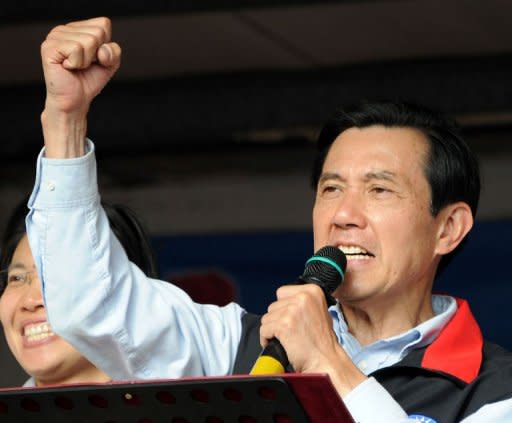Taiwan-China ties could falter after poll: experts
Taiwan's warming ties with China could slow down or even freeze if President Ma Ying-jeou fails in Saturday's vote to secure a new mandate for his Beijing-friendly platform, analysts say. Ma, who won a landslide victory in 2008 on a promise of improving the economy through closer relations with China, is in a tight race with Tsai Ing-wen of the Democratic Progressive Party (DPP), which stresses the island's independence. During Ma's first term, Taipei and Beijing have adopted a series of moves to boost links and trade. But China could be forced into a rethink if the Taiwanese electorate shows that it has been unimpressed by the rapid changes. "If Tsai wins, it will mean a huge setback for China," said Chang Ya-chung, a political scientist at National Taiwan University. "Ties could freeze for one or two years while China observes what Tsai says and does." Chang added that, while adopting a wait-and-see approach, Beijing might suspend some exchanges, cancelling government purchasing delegations of the kind that have recently visited Taiwan to boost the island's economy. Li Peng, a Taiwan expert at Xiamen University in southeast China, warned that "the achievements of peaceful development would disappear" if Tsai wins. "It will be difficult for relations to be sustained. I would even say their development could go in reverse," said Li, assistant director of the university's Taiwan Research Institute. While Tsai has been vague in her campaign about how to tackle the economic giant across the Taiwan Straits, Ma has indicated he will build on the current momentum. Ma's signature policy was a sweeping trade pact agreed with China in 2010. But the agreement has come under fire for exacerbating a growing rich-poor divide in Taiwan. And even if Ma wins re-election, the two sides are unlikely to venture beyond trade into the more risky political field. A key reason is that China's own diplomacy will be in dormant mode as it prepares for a once-in-a-decade leadership change, while tackling growing civil unrest and the impact of the global economic slowdown. "China will put additional pressure on Ma but I don't think the pressure will be too strong as China has other priorities," said Jean-Pierre Cabestan, a Taiwan expert at Hong Kong Baptist University. "Ma will be very cautious as his proposal for a peace accord didn't go down very well on the island," he added. Taiwan and China split in 1949 after a civil war but Beijing still claims the island as part of its territory and wants reunification, by force if necessary. Ma has suggested that Taiwan consider signing a peace treaty with China to formally end the civil war but his critics have slammed the deal as "surrender and unification" in disguise. A peace treaty is widely considered one of the thorniest issues in the complex relations between China and Taiwan, reflected in Ma's reassurance that it would only happen if the island's people agreed via a referendum. Dramatic steps are unlikely in the coming years, not least because the United States, Taiwan's main source of arms, might be expected to put subtle pressure on the island to abstain from upsetting regional stability. The United States prefers the status quo where Taiwan maintains informal independence without taking the potentially explosive step of formally announcing its separate status. "Even if the DPP wins, it is quite unlikely to declare independence or take other precipitous steps that would invite conflict," said John Ciorciari, a political science professor at the University of Michigan. "As Taiwan's principal ally, the United States will work closely with either party and will almost certainly counsel caution and restraint."




